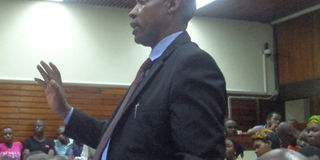Court to clarify authority of parties in handling polls matters

Senior Assistant Director of Public Prosecutions Alexander Muteti speaks before Justice Patrick Otieno in Mombasa on May 11, 2017. He wants the High Court to determine whether special courts gazetted by the Chief Justice have the authority to try misdeeds committed during party nominations. PHOTO | PHILIP MUYANGA | NATION MEDIA GROUP
What you need to know:
- Mr Mwinyi urged the court to dismiss the application by the prosecution arguing that the matter had not been determined by the magistrate.
- The magistrate said if the prosecution finds the charges against the MP do not conform to the Act they ought to drop them.
Political parties’ internal dispute resolution mechanisms do not have the authority to try offences committed under the Elections Act, a court has heard.
Senior Assistant Director of Public Prosecutions Alexander Muteti told the High Court in Mombasa that the Election Offences Act of 2016 created specific courts to try the offences.
Mr Muteti argued that any institution assuming such jurisdiction will be acting beyond its powers.
"Party primaries are purely matters of elections. Election is a process not an event," Mr Muteti said, adding that the process starts from registration of voters.
DROP CHARGES
Mr Muteti was making his submissions during the hearing of a review application seeking the High Court to determine whether special courts gazetted by Chief Justice David Maraga have the authority to try misdeeds committed during party nominations.
The application arose after a magistrate’s court declined to have Changamwe MP Omar Mwinyi plead to two charges against him, which had been filed under the Act and the Penal Code.
Mr Muteti told Justice Patrick Otieno that Mombasa Chief Magistrate Evans Makori erred in law by directing Director of Public Prosecutions Keriako Tobiko to consider dropping the charges against the MP in favour of the party's internal mechanisms.
Mr Mwinyi belongs to the Orange Democratic Movement, led by Raila Odinga.
"The magistrate could not direct the DPP to drop the charges, that is outlawed. The court could not issue such a directive," Mr Muteti said.
He argued that only the High Court can issue such a directive.
OPTIONAL
Through his defence lawyers, Mr Mwinyi urged the court to dismiss the prosecutors' application, arguing that the matter had not been determined by the magistrate.
"The matter is not rightful before you," Jared Magolo argued.
Mr Magolo said the court’s power under supervisory jurisdiction is limited and restricted in "clear" cases.
He further argued that the magistrate was under duty to ensure that the judicial process is not abused.
"The magistrate’s duty included making decisions on what matters to adjourn and for what purpose.
"It is not strange for the court to seek to be addressed on an issue; that cannot be termed as a decision," Mr Magolo said.
Mohamed Khatib, who is also representing the MP, said the magistrate's decision was discretionary.
CONFORMITY TO LAW
The DPP also wants the court to determine whether the internal avenues parties use to address similar problems can be a substitute for the criminal justice system in tackling offences related to elections.
Chief Magistrate Makori had directed prosecutors to ponder whether offences committed during party primaries fall under the Election Offences Act of 2016.
The magistrate said if prosecutors find that the charges against the MP do not conform to the Act they ought to drop them.
Justice Otieno is expected to deliver his ruling on May 23.





